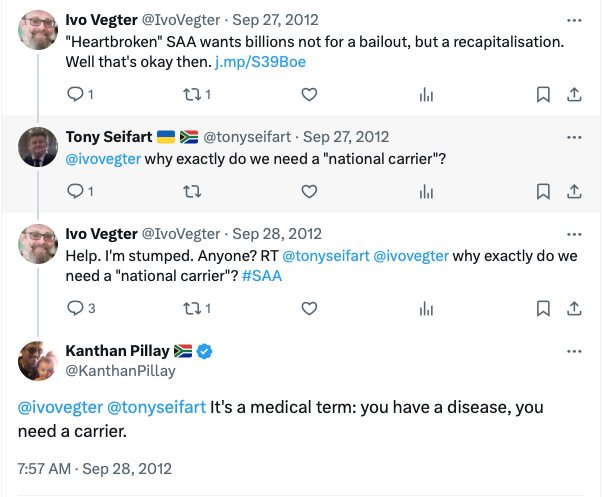
Someone recently asked on twitter: "Why exactly do we need a national carrier?" I responded after a while: "It's a medical term: you have a disease, you need a carrier."
The carrier in this instance, South African Airways, is once again in the news this week and once again flying proud as the standard bearer of everything that's wrong with our country.
If you haven't been up to speed with the sequence of events, let me summarise the essence as I understand it.
Firstly, SAA sold one of its coveted landing slots at London's Heathrow Airport for an undisclosed sum. This, in my view, contributed to the airline being able to declare that it had attained profitability.
(Translation: I've sold my home, I've got nowhere to stay, but at least I paid off the car.)
The board of SAA then tried to borrow money from banks to "recapitalise" its operation.
(Translation: Under normal circumstances, this would be called a bailout, but because we are technically not bankrupt, it sounds better.)
The banks responded: yes, we are very happy to do that, as long as government stands as guarantor of your loan request.
(Translation: We believe your business acumen sucks and you don't have a hope in hell of paying us back, but we're willing to lend you money as long as we've got a fall guy.)
Now under normal circumstances, this would be a shoe-in for the parastatal. Successive ANC governments have ploughed billions upon billions into shoring up the airline's mismanagement. One report puts the figure at R16,8 bn since the 2004/05 financial year.
There is currently a subordinated loan of 1,3 bn on its books as well as a 1,6bn cash injection last year after Auditor General Terence Nombembe raised concerns about SAA's cash flow.
This time around, things were different. When the SAA request for assistance in the order of R6bn was tabled in Parliament around February this year, Public Enterprises Minister Malusi Gigaba put the request on hold. Gigaba told the Cape Town Press Club that discussions were ongoing between himself, Finance Minister Pravin Gordhan, and SAA but that neither he nor Gordhan was satisfied that SAA had a viable long-term strategy, which they believed was necessary before they could agree on financial support.
“The support must not be short-term support that will need to be reinforced in the next year or two,” Business Day quoted him as saying. “Up till now there has been no vision. There have been a number of so-called strategies that were not implemented.” He said stringent conditions would be attached to any financial aid, which would not come “cheap and easy”.
Things kind of stayed in limbo until last month when speculation emerged that all but three of the board members would be replaced. Cabinet spokesperson Phumla Williams confirmed that names had been submitted to Cabinet for approval and that Gigaba would make the announcement soon.Then, Gigaba cancelled SAA's annual general meeting and told parliament that there would be a two month postponement of the tabling of its annual report.
Then, the excrement hit the jetstream — SAA board chair Cheryl Carolus and seven others stepped down.
Carolus said the Minister had cast aspersions on her board. “The comments that the financial statements were not submitted are untruthful and I will not allow my reputation, and that of the board and management, to be called into question,” Carolus told a weekend paper.
Minister Gigaba's spokesman Mayihlome Tshwete said the minister was ambushed by the board.
Tshwete confirmed Cabinet had approved new board members on 19 September and "somehow the list was leaked". He said Gigaba had apologised to the outgoing board for the leak and then had “several engagements” with Carolus to plan a smooth handover to the new board.
He said Carolus had spoken to Gigaba extensively in the days leading up to the resignations and had never mentioned a lack of support.Now here's my very cynical take on the matter to date.
As those of us who are employers who hire people on fixed term contracts are well aware, one of the favourite techniques of employees whose contracts are not up for renewal is to resign dramatically shortly before their term is up.
This allows them to steal the media limelight and exact maximum publicity as aggrieved parties.
In this context, I have no reason to doubt that the minister was ambushed. Had the normal course of events unfolded, the current board would have stepped down, a new board would have tabled a report extolling their own virtues and decrying the deficiencies of the previous board.
At the same time, had I been in the shoes of outgoing chair Cheryl Carolus, I would have acted exactly the same way. It's an untenable situation to submit a business plan and have zero action for six months.
The basic truth that we need to accept is that government here and anywhere in the world is incapable of running a successful business. All state owned enterprises operate as protected monopolies to the detriment of the larger population.
SAA has time and again been fined for anti-competitive behaviour. Those fines get paid to the national treasury and then the money makes its way back to SAA in the form of bailouts.
Am I the only person who finds this patently absurd?
